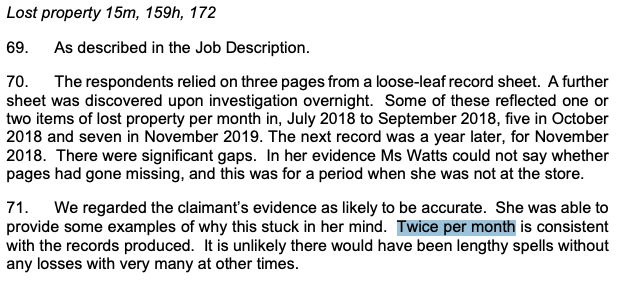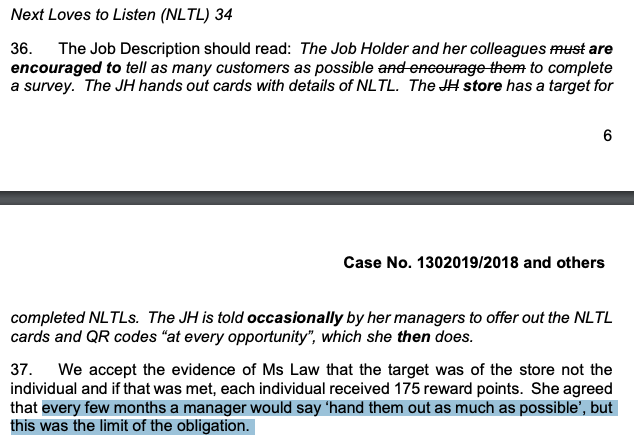[ad_1]
Bruce Greig is a former business owner who now works as a commercial mediator, helping businesses settle disputes out of court.
On 27 August 2024, 3,500 mostly female shop workers at the Next chain of clothing stores won an equal pay claim under the Equality Act 2010 on the basis that they were paid less than Next’s warehouse workers.
These shop workers ought to be paid more. So, indeed, should all of us – and if our economy wasn’t shackled by absurd regulations of the sort that delivered this ruling, we might be.
Why do I say this? Because we think we live in a free-market economy, where capital, goods and labour are allocated efficiently using price signals. We don’t. This makes everyone, including the Next retail workers, poorer.
Like almost everyone, I support laws which prevent discrimination. The equal pay provisions in the Equality Act do, quite rightly, outlaw discrimination. But they also allow courts to adjust wages even in cases where there is, by any reasonable definition, no discrimination at all. The Next equal pay claim lays bare this mechanism.

First, the big picture. Are the shop workers being discriminated against? I say not. There was nothing to stop the shop workers choosing to work in the warehouse and take the higher wage there. Next even had a scheme to encourage such transfers. Almost half (47 per cent) of the workers in the warehouse were, in fact, women.
But the claimants did not want to work in the warehouse. One of them said that the warehouse job “did not seem particularly attractive” and she would only consider doing it if she was paid “a lot more money”:
So shop workers were free to take the higher wage in the warehouse, many did, the claimants didn’t, so surely they have no claim? How is it that the tribunal can still adjust their wages?
Let’s take a look at what the Equality Act actually expects the tribunal to do.
Step One: Write a new job description for the claimant’s job, and another for that of the higher-paid ‘comparator’ (in this case, the warehouse worker). This exercise required 11 days of tribunal hearings and 10,000 pages of evidence. It is extremely careful and detailed. How much time do shop workers spend handling lost property enquiries?

How often do they hand out “Next Loves To Listen” feedback cards?

When a delivery comes to the store, there are six layers of cartons in the delivery van. The van driver is supposed to help with the top layer, leaving the shop workers to move the rest. But does he always do this? Or do the shop workers sometimes have to handle the top layer too?

And so on.
The lawyers know what’s coming next in Step Two, so throughout this process the Next legal team tries to big up the warehouse job to make it seem very different to, and much harder than, the shop job. The shop workers’ team push back.
Hence the intricate discussion about six layers of cartons. If the shop workers always handle all the cartons, that makes their job a little bit more like the warehouse job.
At the warehouse, does putting a small jewellery package in its own tray on the conveyor belt require an “autonomous assessment” on the part of the worker? Or a mere “assessment”? “Autonomous” would require more responsibility and decision-making, which will become important later. The tribunal rules that it is a mere “assessment” and strikes out “autonomous” from the job description:

How physical is the warehouse work? Does it lead to physical exhaustion, or merely an ache?

Is the warehouse worker at the limit of physical endurance and ‘driven by pure adrenaline to complete the task’? Tribunal says no:

This all seems tolerably reasonable so far. If you are trying to decide if two jobs are similar, you need to carefully figure out what each job actually entails.
It is the next step where things drift away from what most people would consider reasonable.
Step Two requires the tribunal to compare the value of the work done in each job. Recall that the Equality Act requires that men and women must receive equal pay for work of equal value. Equal value means “equal in terms of the demands made on each worker by reference to factors such as effort, skill and decision-making”.
So, the tribunal takes a look at how much effort, skill and decision-making each job requires.
Well, really the tribunal gives this only a glance. They subcontract the work to a small team of independent experts. The experts come up with a list of factors common to both jobs. Factors like “physical skills” or “communication skills”.
For each job, they assign a numeric value to each factor, based on a reading of the job description which the tribunal has written in the first step. So if “physical Skills” was one of the factors you might give this 100 for a drayman and 20 for a telephonist. If “Communication Skills” was another factor, you might reverse those scores for drayman vs telephonist.
The experts go through this exercise for the shop workers and the warehouse workers. Then they just add up the scores. With some caveats, a bigger score means higher value.
The huge, glaring, flies-in-the-face-of-common-sense problem here is that there is no weighting applied to any of the factors. The experts acknowledge this and say that:
“There is no objective basis on which an Independent Expert could justify whatever weighting or form of weighting they chose to apply to their assessment scheme.”
But of course, the failure to apply any weighting means that the very choice of factors largely determines where the scoring ends up. If your list includes lots of non-physical factors, and not many physical factors, then the less physical job is going to score more highly.
For example, rather than just having “Mental Demands” as a single factor, you could expand it out to “Problem Solving and Decision Making” and “Planning and Organising” and “Knowledge” even though these might be considered to really involve much the same thing. This is exactly what happens:

Had the experts chosen factors such as “Balance”, “Dexterity”, “Strength”, and “Flexibility”, and left “Mental Demands” as a single factor, the warehouse job might have scored more highly.
But we are now deep in the weeds. The real problem here is not the choice of factors. It is that we are over-riding the actual preferences of the people working in these jobs and deciding wages by diktat.
By setting pay through tribunals rather than market demand, we are discouraging people from pursuing higher-paying, less attractive jobs. This inefficiency ultimately lowers productivity, reduces economic growth, and leaves everyone a little worse off
Recall that Next ran a scheme to encourage shop workers to move to the warehouse. Is this outcome fair to those who did transfer to the warehouse – who spent years toiling in a less pleasant working environment for, as it now turns out, no extra pay? Will they be compensated?
No, they will not. They have been stitched up by the Equality Act. We all have, because of the drag this puts on our economy.
I will say it again: we should outlaw actual discrimination, where people are treated unfairly because of their sex or race or other protected characteristic. But I do not think that there was discrimination here. The warehouse workers were paid more not because they were men (almost half were women), but because it was hard to attract people to do that job.
Meanwhile the shop workers preferred to work in the shop, even though the pay was lower, because the hours were better, it was easier to reach, the environment was more pleasant, and so on.
Our overriding principle should be that people can choose a job with pay and conditions which match their preferences. This allows for the efficient allocation of people to jobs and everything works more efficiently and everyone’s quality of life improves. The state should only step in to correct actual discrimination.
Is any politician talking about changing this? Not that I have heard. Who would be brave enough to argue against ‘equal pay’?
So these court-imposed wage adjustments will continue. Leigh Day, the law firm which brought the Next claim, has another 100,000 claims against other retailers. Birmingham City Council is already bankrupt, in large part because of equal pay claims.
What more is to come? Consider flight attendants and pilots: do flight attendants (earning about £40k per annum) do work of equal value to pilots (earning about £150k per annum)? The flight attendant needs many skills, but the pilot only needs one. How would that look in a job evaluation table? Male and female footballers? Almost identical set of skills, very different wages.
All large employers will have slight gender imbalances between different types of job. All of these can now be targets of equal pay claims, regardless of whether there is any actual discrimination going on.
There is talk of extending these rules to allow comparison between other groups, not just men and women. Will we reach a point where everyone’s earnings are set by job evaluation experts, with no regard for their own preferences?
This slow erosion of the market causes harm to all of us. The warehouse workers have had their pay premium removed, whilst consumers will have to pay slightly higher prices to cover the higher wages of the people serving them in the shops.
Such effects may seem tiny, but they must add up. The drag that this and other nuisances have placed on our economy since around 2008 is clear from this graph:

It is reported that the Next claimants will receive about 40p compensation per hour worked, adding up to a few thousand pounds each. But if it weren’t for the economic drag caused by a decade and a half of near-stagnation the Next shop workers would surely be better off by many times that amount.
I’m not blaming the Equality Act for all of this stagnation, but it must have some dragging effect, and I say that without that drag the Next workers would be better off by much more than 40p an hour.
All of us would be. Had we grown our productivity as much each year as the USA has, we would have a society which could pay for more special schools, more monoclonal antibodies, more sports halls, more courtrooms, more of everything that a rich and prosperous society should have. Those who have overseen our gradual decline deserve their political oblivion.
[ad_2]
Source link



